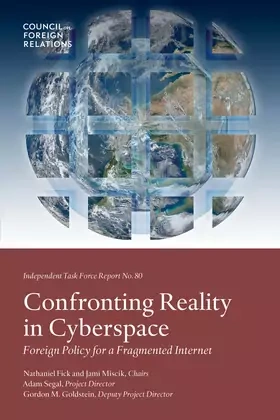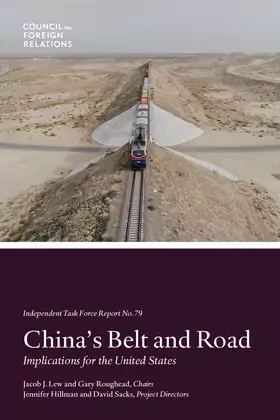Task Force Program
Recent Task Force Reports

U.S.-Taiwan Relations in a New Era
Although a conflict in the Taiwan Strait has thus far been avoided, deterrence has dangerously eroded. To maintain peace, the United States must restore balance to a situation that has been allowed to tilt far too much in China’s favor.

Confronting Reality in Cyberspace
The early advantages the United States held in cyberspace have largely disappeared as the internet has become more fragmented, less free, and more dangerous. The United States needs a new foreign policy for cyberspace to secure its economic and security interests.

China’s Belt and Road Initiative
China’s globe-spanning Belt and Road Initiative poses risks to participating countries and challenges to U.S. interests abroad. The United States should coordinate with partners to promote a secure and sustainable development agenda of its own.
CFR has launched a Task Force on Space Management Policy, chaired by retired Lieutenant General Nina Armagno, USSF, and former Congresswoman Jane Harman. Esther Brimmer, CFR’s James H. Binger senior fellow in global governance, serves as project director. Composed of thirty-five experts, the Task Force is examining challenges in low Earth orbit and beyond, places where the acceleration in human activity is most evident, in a time of heightened geopolitical and commercial competition. The Task Force aims to produce a consensus report in late 2024 that offers findings and recommendations that can help frame the future of the space economy, national security, and the sustainable use of the space domain.
-
Since World War II, the United States has identified the security and stability of the Gulf region as a vital national interest. This publication presents two documents. The first, Differentiated Con…
-
NATO’s decision to enlarge comes at a time of historic opportunity. With this growth, NATO will issue invitations to additional European states, thereby extending and reinforcing the zone of stabilit…
-
Despite the growing severity of the drug abuse problem in the United States and evidence that supply-control programs are ineffective, the supply-side approach to drug control has endured. This task …
-
Relative to the average of the 1980’s, U.S. government spending on international affairs has fallen nearly 20 percent in real terms and will decline by as much as another 30 percent under budget-bala…
-
Nonproliferation, Arms Control, and Disarmament
Executive Summary Fifty years after gaining independence, India and Pakistan remain at odds. Given both countries’ de facto nuclear capabilities, their continued rivalry flirts with disaster. Yet … -
Nonproliferation, Arms Control, and Disarmament
Five years after the collapse of the Soviet Union, the United States and Russia stand at a crossroads on arms control. Many of the arms control regimes established by Republican and Democratic admini… -
This statement and report—the result of an expert nonpartisan Task Force including UN critics and advocates, Republicans and Democrats, liberals and conservatives—examine whether the United Nations h…
-
The need for intelligence, and for a capability within the U.S. government to collect, produce, and disseminate it, remains critical. The end of the Cold War will not usher in an age of peace and sec…
 Online Store
Online Store











